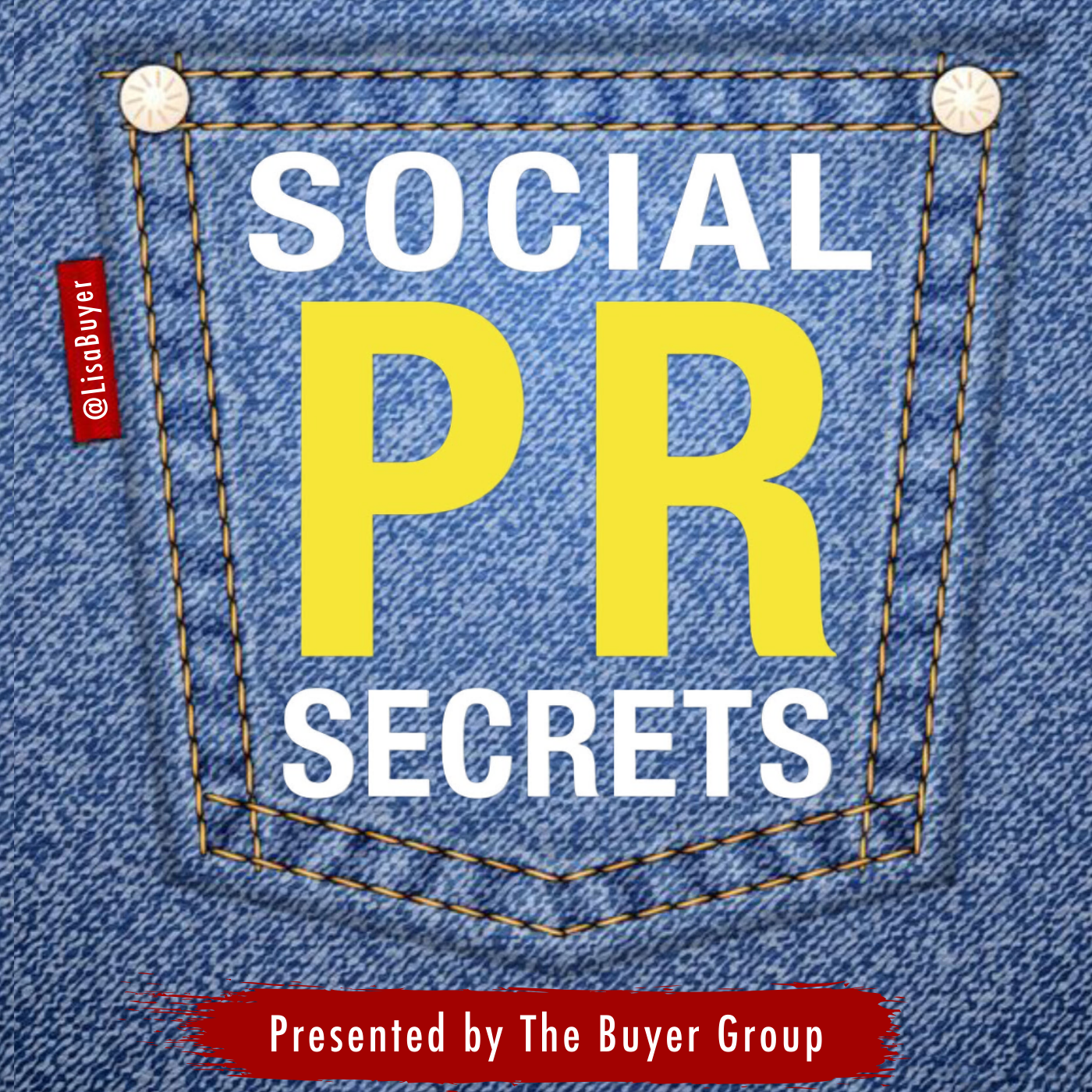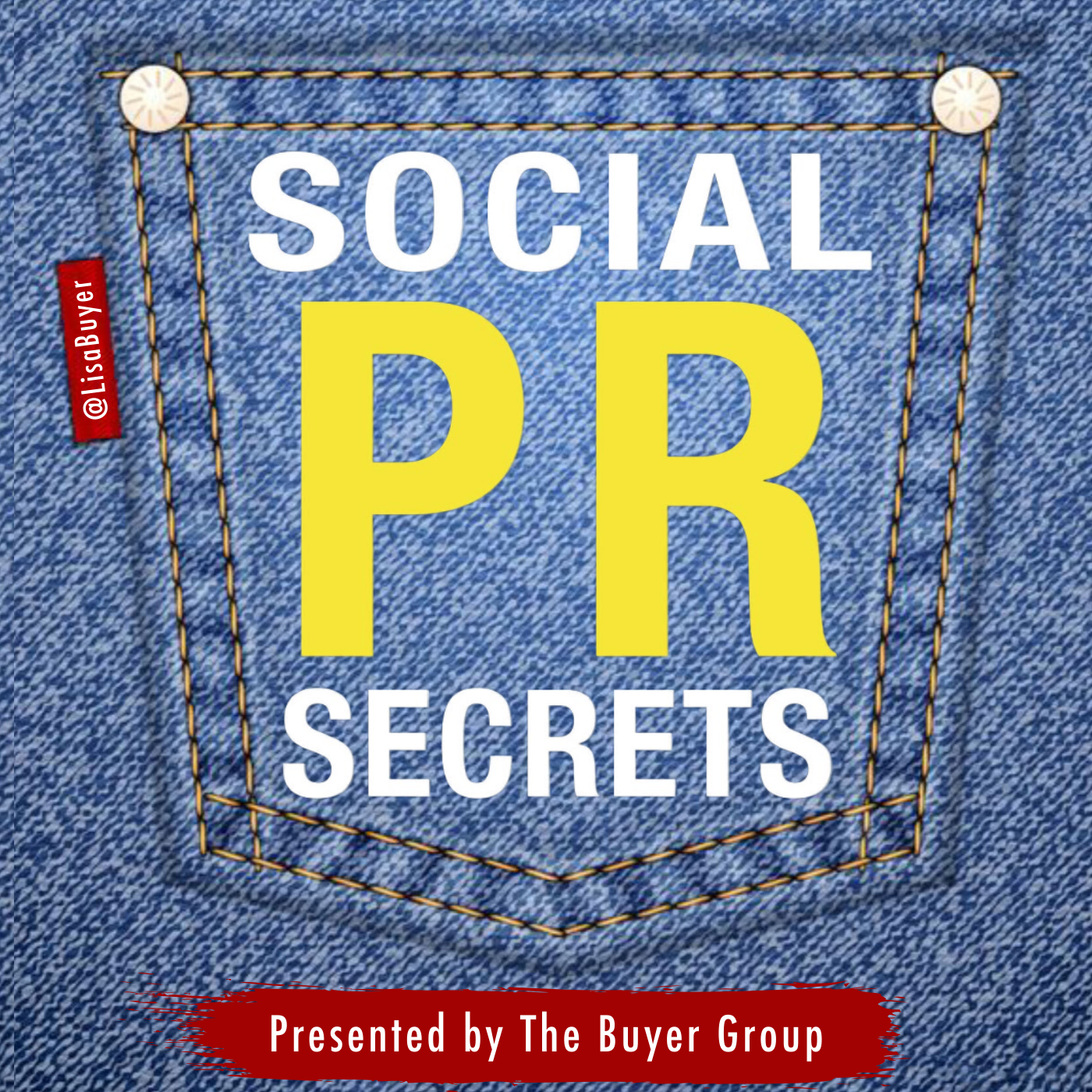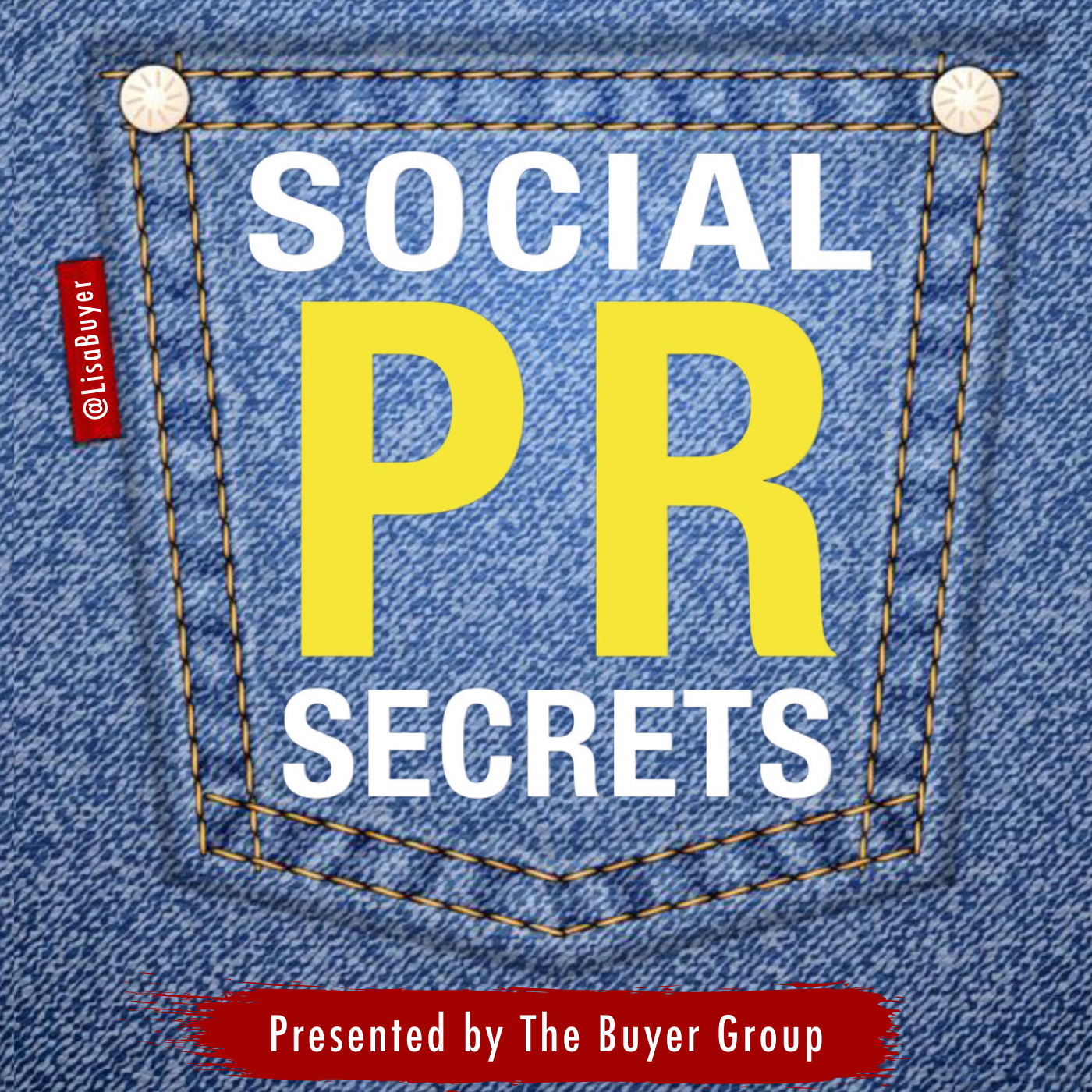Speaker 1 00:10 Welcome to another episode of social PR secrets. My name is Lisa buyer and I'll be your host. Today's guest is Joe McGleesy. I met Joe at a conference when he was speaking about how Buzzfeed handles their social media management. So I was so intrigued. I invited him to be a guest for my social media management class that I taught at university of Florida a few years ago. In this episode, Joe talks about the social media revolution, where we've been and where we're going and how Buzzfeed fits into the whole picture. It's super insightful and I hope you enjoy it as much as I enjoy talking to Joe. Okay. Hi everybody. We are having a very exciting guest today for the week talking about social media revolution. Um, we've all heard of Buzzfeed and I have invited the director of creative strategy, Joe Pugley. Joe McGleesy.
Speaker 2 01:09 You had it perfect before.
Speaker 1 01:10 I know, I know, right? Um, Hey Joe. So thanks for joining the class today. And I'm going to just go ahead and dive right in and ask you some questions about this whole social media revolution that you've been a big part of being at Buzzfeed. Sounds great. So, um, as far as the social media revolution, how does Buzzfeed fit in? And if you can give us kind of like, uh, you know, where we are today with, with what's happening.
Speaker 2 01:32 Sure. So both of you started as a thought experiment, you know, how do we track and measure the way that people share content on the internet? And it started before social media was prevalent or used by a large number of people. It started when our founder, Jonah was interested in the way that people were passing email chains back and forth, um, and through a number of small tests with stuff that he made, um, like his brilliant work with Nike, you can Google it. Um, or some of his other initial experiments. He wanted to understand why, why content went viral, quote unquote. Um, and that's where Buzzfeed came in. Uh, it was, it was initially built as a technology to measure content moving across the internet. But as social media became the predominant way that people share things, you know, it went from, from uh, email and chat to things like Facebook and Twitter.
Speaker 2 02:29 That became a big part of the Buzzfeed story. And simultaneously Buzzfeed moved from aggregation and, um, and, and content collection in a content curation into creating our own content, right? So like creating things from scratch instead of just found things. Um, so all of these things were happening at the same time, but the core of Buzzfeed and what I think makes social media so interesting to us as a platform for connection is why do people share things and, and how do they share them? So the beginning of Buzzfeed, people were sharing things in a variety of different ways, but it wasn't nearly the, um, the, the wide variety of media platforms that it is today. And we've stopped thinking about it in terms of digital versus, um, versus traditional and more about, you know, how do we create something that people actually want to see and inspire them to give it to other people. And so that's, that's where we're at today. And, and using different platforms in the way that they're meant to be used as a huge part of that. You know, Facebook is, is a tool for connection and projection of your own identity. Whereas Twitter is a much more immediate platform that, um, only has a shelf life of, of ours. And so how do we think about creating things and then putting them in these places where they make sense. You know, context is really key and in social media context is almost the most important thing.
Speaker 1 03:50 So if we're in this social media revolution and I, we interviewed David Meerman Scott about the evolution of social media and one of the things that he pointed out as far as the social media revolution is we're really just getting started. And what do you think about that? Where do you think we are right now in the social media realm?
Speaker 2 04:11 Well, what's interesting about it up to this point is we're still, I don't want to say limited, but the cap on how prevalent social media can be in our everyday lives. And the functionality of it is limited to technology and broadband technology, right? Connectivity is only as fast as your phone or your internet connection, which is interesting because it's already come so far to become a part of our daily lives, you know, it's the way that we think and communicate both in a personal and professional setting. Um, so I do think we're just getting started because people still separate social media and digital media from traditional media. And I think as we move into a new world where all of these things start to coagulate and become one social media will just be seen as not, not quite social because all media is and is inherently social or should be, right?
Speaker 2 05:02 We want to put things out there that people actually care about to give to each other. Um, but social media will become personal media. You know, it's about you. It's about what you need to project or consume. Um, and there'll be personal media, corporate media. You know, I'm thinking out loud now, but, but I think that the idea of social media is, is a good container for the ecosystem we have now. But I think we're going to see the idea of social media change a lot, um, and bifurcate into different purposes that make more sense, um, for the, for the, uh, the world at large. But it is an interesting time and it's, it's certainly just getting started.
Speaker 1 05:38 And from a business standpoint, what do you think the opportunity is for businesses with social media? I mean, obviously Buzzfeed, you know, has embraced it. Um, but if we look back even a year ago, we didn't even have some of these channels like Meerkat and Periscope and totally even a year ago, still not every
Speaker 2 05:57 brand has embraced the opportunity of social media. So what do you have to say about brands and business and social media? The opportunity is massive, but it's also, it's also dangerous, um, for brands that don't want to be honest about themselves. I think the opportunity with, with social media is that it's a much more connected medium. And so a brand can really humanize themselves and latch onto the things that are important to them as a brand and connect with the people who have similar, um, similar interests and similar values. Uh, but that's a double edged sword. You know, brands who don't want to be honest or authentic are going to find it very difficult to enter this space. Um, what I love about social media and the new digital landscape in general is that advertising is traditionally evil. Um, but that is because advertising has always been interrupted, right?
Speaker 2 06:47 It is always an interruption to whatever it is you're actually trying to do. But what, what if instead of taking that as our base model, we created advertising that was complimentary or even the content itself. And that's the idea behind what Buzzfeed does with our advertising partners is we don't want you to interrupt our audience. We want you to engage our audience in a way they want to be engaged. And if your message can reach the right people in the digital space, the only way to do it, I think is to tailor it so that it reaches the right people and inspires them to share it with other people. Um, so this is a challenge, especially for advertisers who have big wallets and, and short attention spans. They want results and they want their message in front of as many people as possible. And for a lot of things that aren't quite as interesting, like, like insurance or banking, that's the play, right?
Speaker 2 07:40 They have deep pockets and they want broad awareness or they want to do a number of things. And we run into that. We run into that all the time. Um, but I would say that the war will be fought and won with, um, content that really speaks to the values of the brand and engages people and also gives them a reason to communicate with it. Because you know, today's consumer, um, often referred to as a millennial, uh, whatever you want to call them. Um, they can smell the BS from a mile away. And I think advertisers are really understanding that now. And the way to, um, the way to confront that is to be honest about your brand and create a story that really connects with them. Because what social media is doing for advertisers is humanizing them. Now we know humans are complex creatures and so our brands and sometimes there are complexities that aren't as pleasant. You know, not every brand is your best friend, but just like, you know, we live our lives. Brands need to decide who their friends are and who their friends aren't, you know, a friend to all as a friend to none I think cause the famous expression. And I think that that's also true for someone selling a product. Not every person on the planet wants your product. It's going to be finding out who the right people are. Great. Okay. And Joe, we met at social when
Speaker 1 08:56 you were, um, speaking at that conference.
Speaker 2 08:59 Yeah.
Speaker 1 09:00 Here we are today. So what I'd like for you to share with us is the one minute version of what's a day in the life like for the director of creative strategy at Buzzfeed. What does it look like for you each day? I'm sure it's different, but can you give us a glimpse?
Speaker 2 09:14 Yeah. So it's changed a lot and I think it's about to change even more as we evolve from a company that that was only making Buzzfeed post content to content in general, you know, post video, um, and, and distributed content on social platforms. And potentially even real life content. You know, it's an exciting time to be me, humble brag. Um, but, um, uh, a normal day for me is I come in, I manage a team of about five creative strategists who have, uh, a bunch of different functions. They educate our clients on what we do and what our best practices are and creating great shareable content. Um, they work on specific clients that are like their babies that they take care of and they are the creative face of, um, and they also work on pitches for new prospective clients, um, and, and big and big ideas, you know, bigger than just where you make this Buzzfeed list for you.
Speaker 2 10:10 Um, so I manage that team and I also do a bit of that work myself. So I go and sit with prospective clients and explain to them, you know, what is the philosophy of Buzzfeed and how do we do it? Um, and I also work on some post programs myself. Uh, Geico is one of our biggest clients and that's that guy. I've been a part of the Geico team basically since I started three years ago. Uh, so I'm usually talking about Geico at some point during the day. Um, and then, yeah, and then I think it was, uh, a small but important portion of my time is dedicated to thinking about what we're going to do next. Now we have this huge video studio in LA, but we need to bridge the gap between our video business and our creative business across the globe. You know, we're not doing video everywhere and how are we going to, as a creative organization, tie all of these things together holistically.
Speaker 2 10:57 You know, it's, the answer is, is not clear and it hasn't been, um, even up to this point, you know, um, Buzzfeed and Buzzfeed video operators to different companies. Um, but we need to figure out how we get a creative and cohesive package together for clients. So, you know, Frank Cooper just joined Buzzfeed, um, formerly of Pepsi, Google him. Um, he's big deal. Um, but we're really excited to have him as a new leader and I have been talking a lot to him about how we're going to take our creative output to the next level. And, uh, it's really exciting. So a lot of thinking about the future, which is great. Um, Buzzfeed is expanding all across the globe, which is really cool to see.
Speaker 1 11:38 And if the future social media managers that are watching this would like to apply for a job or an internship at Buzzfeed, I found a link that I'm going to put on my class notes so you can look for that. Any tips on that end of it?
Speaker 2 11:50 Um, so my first tip would be to think about how you create things. Oh, this is a, this is like a fellowship with Buzzfeed creative or what's the exact job? Okay. So the first thing would be to figure out where in the company this job is. Are you creating for edit the editorial team or are you creating for my team, which is a more difficult team, but ultimately more rewarding because we're really driving the business of Buzzfeed. And if you're auditioning for my team, then I have just a few tips for you. The first would be that you really need to think about not just being good at writing internet stuff or having internet knowledge, but understanding the context in which you are creating things. Um, because we as we know, all social media platforms are not created equal. The other thing that I think is probably more important is you should come in with a hunger to understand not only how social media and creativity can drive, um, can drive brands goals and, and um, and what they're trying to accomplish in the advertising space, digital advertising.
Speaker 2 12:55 But how data and technology can also power that. Because Buzzfeed is first and foremost a technology company. And we always have been, that's not to say that I like do any dev work or have any understanding of coding other than something very rudimentary, but understanding how technology is important to our advertisers just as much so as our creative output is the key to a good buzz feeder and, and a natural curiosity for learning. Always learning and optimizing what we're doing. You know, we were never satisfied with our output. We always want more. We always want to create something better than we had before. Um, so those are some of the qualities that we look for, you know, good, good knowledge of the internet, sure. But also a hunger to grow and and appreciation for the technology that we've built.
Speaker 1 13:39 Okay. Awesome. Joe, thank you so much. Joe is going to be back with us the week that we're talking about social media content, which is the perfect topic when we are matching that topic with Buzzfeed, the brand.
Speaker 2 13:51 Awesome. I'll make sure to wear the same outfit so no one okay with you in a couple of weeks, okay.
Speaker 0 14:02 Okay.
Speaker 1 14:07 Thank you for listening to this episode of social PR secrets. If you like what you heard, check out the book on Amazon or follow our
[email protected] this episode was sponsored by the buyer group, a social PR agency, striving to keep our balance in the digital world, practicing public relations, social media and search marketing while occasionally drinking a glass of wine or two for the best creativity and results. Thank you all for tuning in. If you would like to get a free chapter of social PR secrets, go to social PR secrets.com/free.


